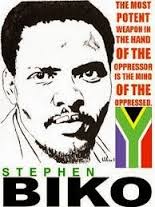
The Black Consciousness Movement is an umbrella term used to describe the black consciousness ideology and the different organisations and groups centered around it. The ideology was propagated in the sixties, mainly by students. They formed numerous organisations through which to channel their black consciousness propaganda. Steve Biko, who died in custody in September 1977, was a major exponent of the black consciousness philosophy.
Some of the most influential black consciousness groups, such as the Black People’s Convention (BPC) and the South African Students’ Organisation (Saso), were banned in October 1977. Subsequently the Black Consciousness Movement has been used as an umbrella term to de-scribe the different groups or organisations such as Azapo and National Forum which replaced the banned organisations.
Black consciousness can be described as an awareness among blacks that their human identity hinges on the fact that they are black. Blacks (which, in this definition, include Indians and coloureds) are proud of their skin colour, and aware of the fact that they have their own black history and culture, differing from that of whites. They no longer accept being judged according to white values and norms. This means that they must psychologically liberate themselves from the “slave mentality” created by “institutionalized racism” and “white liberalism”. In essence, black consciousness is an attitude towards life. It is very difficult, if not impossible, for whites to be included in black consciousness groups.